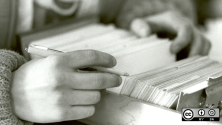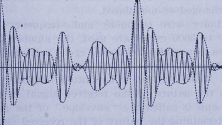Serendipity was once described to me as looking for a needle in the haystack and finding the farmer's daughter. In the case of the Open Well-Tempered Clavier, it was rather trying to make an open source version of Bach's music and finding out that blind musicians face a critical shortage in the number of braille scores they have available to study. And, unlike every other time someone has come to this realization in the past 200 years, there is now actually something that can be done about it, using open source software.
Making open source music with open source tools such as MuseScore is the original goal of the Open Well-Tempered Clavier project, and that's what attracted Eunah Choi, a teacher in South Korea, to become a backer on Kickstarter. This led to a casual email conversation about the project, and the innocent questions "Are you a pianist?" and "Do you study music?" The answer that Eunah provided is touching and heartbreaking. You can watch for yourself as she recorded a video message of the email, but the short version is, she is blind, and there are not enough scores in braille to constitute a serious study of piano. Ultimately, she abandoned the dream of becoming a career pianist.
This revelation didn't sit well with me or with the MuseScore team. We had set out to make music accessible, and had obviously failed, for exactly the group of people who needed us the most. So we asked ourselves, "Can it be fixed?" The answer to that question is most definitely, "Yes!" MuseScore has long embraced open standards, such as MusicXML, and there are open source libraries, Freedots and music21, which attempt to convert MusicXML into braille that is suitable for reading on devices like the one Eunah uses in her video. Both libraries are unfinished products and require more development.
Armed with this new information, the Open Well-Tempered Clavier project extended its mission and set up new stretch goals on Kickstarter. Assuming adequate funding, the team will not only produce a public domain score and recording of Bach's Well-Tempered Clavier (the original goal), but also a braille version. We will then create a braille version of Bach's Goldberg Variations which we released in 2012. As a consequence of these efforts, we'll be able to make an accessible and free web service to automate the conversion pipeline of MuseScore and MusicXML scores into brailleand automatically convert the more than 50,000 scores in the MuseScore.com library.
Given that there are less than 20,000 titles currently available in braille format, the addition of 50,000 more titles is significant. Lowering the barrier of conversion for digital scores, and releasing the tools as open source software, guarantees that the number will grow and grow.
It is the responsibility of the sighted to provide copies of our cultural treasures in formats that can be read by the blind; open source software will help us uphold that duty.







3 Comments